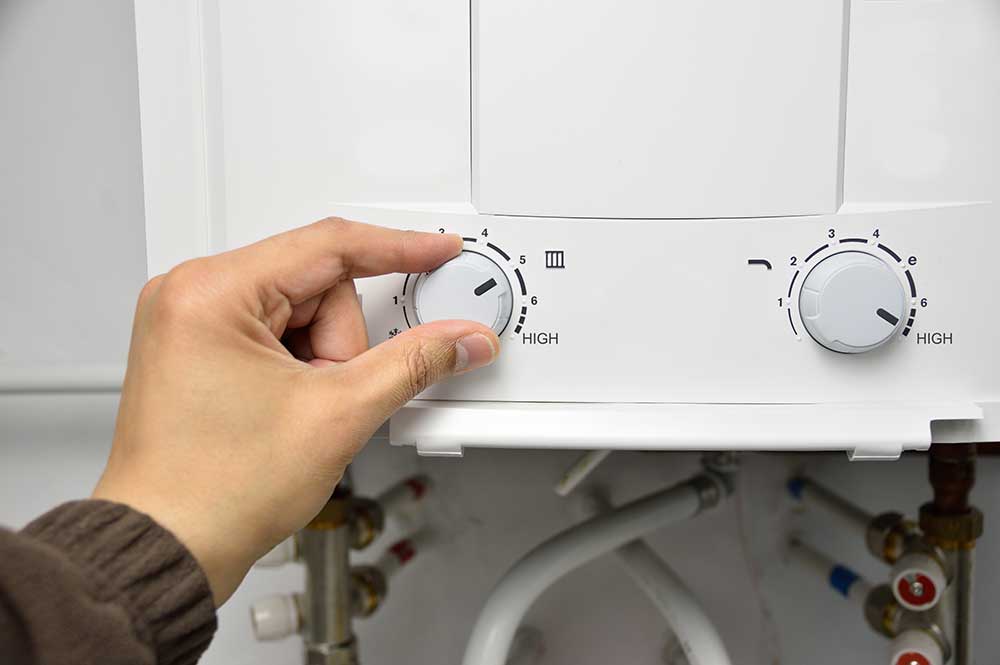Energy Efficient Tankless Water Heaters
RELAX, WE'RE ON THE WAY
Call (317) 881-7738 anytime... day or night!

FAST RELIABLE SERVICE

LICENSED & INSURED

WARRANTY & MAINTENANCE
The Difference Between Tankless Water Heaters and Traditional Water Heaters
As mentioned above, the main difference between a tankless water heater and a traditional water heater is a storage tank. A traditional water heater holds the water in a storage tank and maintains the temperature. When a tap is turned on, the water stored in the tank is distributed. On the other hand, a tankless water heater heats the water as it is being demanded.
According to Consumer Reports, a price comparison found traditional water heaters less expensive than their tankless counterparts. Tankless water heaters also have a higher installation cost due to electrical outlets, upgraded pipes, and new ventilation systems being a necessity. While tankless heaters may have higher upfront costs, they will start to pay for themselves in only a few years due to the money you are saving with its efficiency.
However, according to Energy.gov, tankless water heaters are more energy-efficient, which can save you more money than a traditional water heater. Traditional water heaters are subject to heat losses; therefore, they need to periodically heat the water in the storage tank, which results in more energy use and costs more money. On the contrary, tankless water heaters have a limited flow rate of hot water.
Tankless water heaters have a life expectancy of more than 20 years, compared to traditional water heaters that usually last only 10-15 years. In addition, tankless water heaters don’t risk tank leaks because there is no tank. Traditional water heater storage tanks can easily corrode and leak, which can lead to possible water damage.
Traditional water heaters use better insulation and heat traps. However, with a tankless water tank, you don’t need heat traps. Traditional water heaters have efficient combustion systems, whereas tankless heaters use a secondary heat exchanger to make the most out of the combustion system.
Energy Efficiency
The main benefit of tankless water heaters is their energy efficiency. In the energy-conscious world we live in today, people are always searching for the best energy-efficient options. With tankless heaters, there are no losses due to standby or cycling energy. In addition, these types of water heaters provide an endless supply of hot water.
Based on statistics gathered by Energy.gov, in homes that use 41 gallons of water or less in a day, tankless water heaters can be 24%-34% more energy efficient. For homes that use more hot water, at approximately 86 gallons each day, tankless water heaters can be 8%-14% more energy efficient. Energy efficiency is a significant benefit because it means more savings for you and your family.
A Smart Investment
Another benefit of tankless water heaters, which can result in even more savings, is that they have replaceable parts. Since parts are easily replaced, their life is extended by years. They have a general life expectancy of more than 20 years. Overall, a tankless water heater can save you anywhere between $70-$100 a year.
Space Savers
Another benefit is the amount of space you’re saving with a tankless water heater. You don’t have to worry about the giant eyesore that comes with traditional tank water heaters. Tankless water heaters are small and can be put somewhere out of the way and out of sight.
Qualifying For Incentives
Buying a tankless water heater can qualify you for incentives that can take away from its cost. You can check out Energy Star’s fact sheet to compare possible incentives. You can also reduce your costs by checking out rebates.
Gas vs. Electric: Which is Better?
It is subjective when it comes to choosing between a gas heater model or an electric model tankless water tank. One could be better for one person, while the other could work better for another person. What you mainly want to take into account is the cost difference between the two.
Electric heaters are cheaper than gas heaters. Electric models are easier to install, more compact, and have higher energy efficiency. However, gas heaters are generally more powerful and tend to even out the initial cost in the long run.
Electric heaters generally provide a hot water rate of approximately 2-5 gallons per minute. A gas-powered water heater has a marginally higher flow rate. This means that a gas water heater will be able to handle simultaneous use better than electric heaters. However, if your home is older, you may need to upgrade your home to operate an electric water heater.
Buying Guide
There are several factors to consider when perusing the best tankless water heater to buy. The main factors to consider:
- Size: This relates to your household’s needs for power. Each household needs a different sized heater. Your household needs can be calculated by determining how many gallons of hot water are needed and comparing it to how much water the heater produces per minute (GPM). You also need to consider whether you will be using multiple appliances or devices at the same time, such as the dishwasher and shower.
- Fuel type: The options are electricity, fuel oil, geothermal energy, gas, propane, and solar energy. The more common options are gas and electric. The fuel type that is best for you depends on your location and your budget.
- Availability: This has to do with whether the particular tankless water heater you want is available in your residential area and whether the fuel type you wish to choose is available in your area.
- Energy efficiency: Most people want the most energy-efficient tankless water heater. The energy factor (EF) is the water heater’s energy efficiency indicator.
- Price: You need to consider the initial costs for installation and the energy factor and fuel type, which heavily impacts the overall cost. Installation can sometimes cost more than the actual water heater. You may need to move around some pipes or get a new ventilation system, and sometimes hiring someone to install it can be pricey.
Once you’ve taken all of these factors into consideration, it’s best to schedule an in-home estimate with a professional installer. The installer will be able to provide you with an accurate estimate of installation costs.
Maintenance costs also need to be taken into account when buying a tankless water heater. Tankless heaters have low maintenance costs, but they still are present to get the best water output.




